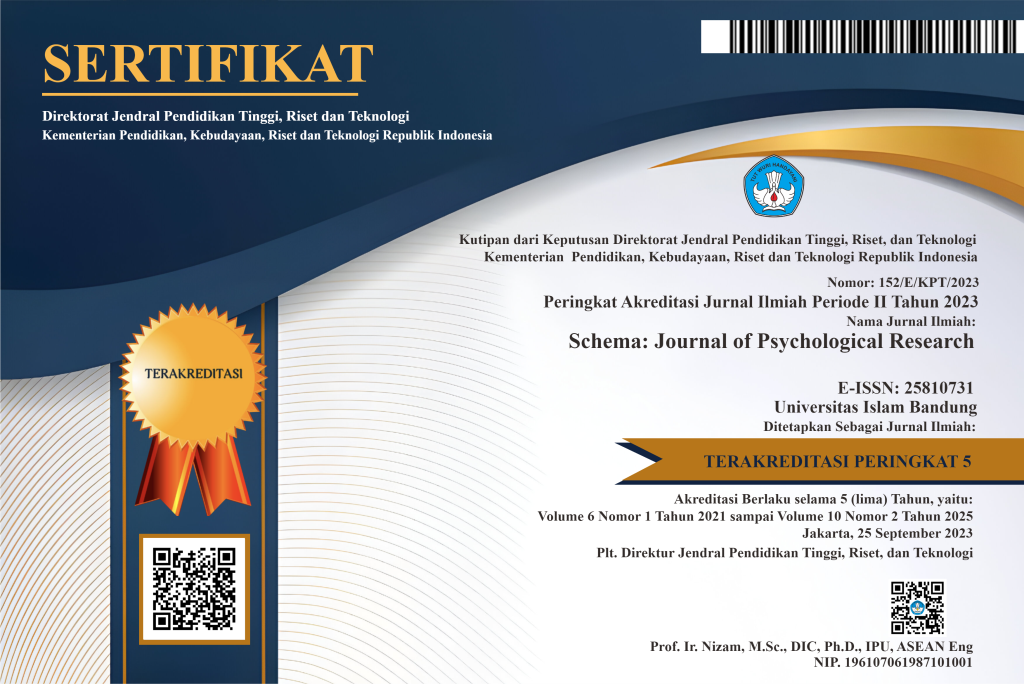Pengaruh Resiliensi Terhadap Depresi Pada Emerging Adulthood
Abstract
Individu dengan usia 16 – 24 tahun merupakan kelompok dengan tingkat depresi tertinggi di Indonesia. Depresi terbukti memiliki dampak negatif bagi individu yang mengalaminya, sehingga perlu ditelusuri hal apa yang dapat menekan angka depresi. Penelitian ini bertujuan untuk mengetahui pengaruh resiliensi terhadap depresi pada emerging adulthood dengan menggunakan pendekatan kuantitatif yang melibatkan 165 partisipan berusia 18-29 tahun di Jabodetabek. Instrumen yang digunakan yaitu Beck Depression Inventory-II (BDI-II) dan The Connor Davidson Resilience scale (CD-RISC). Hasil analisis regresi menunjukkan bahwa resiliensi berpengaruh secara signifikan terhadap depresi pada emerging adulthood. Resiliensi juga berpengaruh negatif terhadap depresi pada emerging adulthood. Semakin tinggi resiliensi maka semakin rendah depresi, dan semakin rendah resiliensi maka semakin tinggi depresi pada emerging adulthood. Oleh karena itu dengan adanya kaitan antara resiliensi dan penurunan tingkat depresi menjadikan individu harus melakukan upaya dalam mengembangkan resiliensinya dan meningkatkan kemampuan dalam menghadapi berbagai tantangan yang dapat menimbulkan depresi pada masa transisi ini.
Keywords
Full Text:
PDF (Bahasa Indonesia)References
Alpizar, D., Luciana, L., Scott, W. P., & Brian, F. F. (2017). Evaluating the eight-item patient health questionnaire’s psychometric properties with Mexican and central American descent university students. Psychological Assessment. doi:10.1037/pas0000521.
Álvaro, J. L., Garrido, A., Pereira, C. R., Torres, A. R., & Barros, S. C. (2019). Unemployment, self-esteem, and depression: Differences between men and women. The Spanish Journal of Psychology, 22.
Arini, D. P. (2021). Emerging adulthood: Pengembangan teori Erikson mengenai teori Psikososial pada abad 21. Jurnal Ilmiah Psyche, 15(01), 11-20.
Arnett, J. J. (2007). Emerging adulthood: What is it, and what is it good for? Child Development Perspectives, 1(2), 68-73.
Arnett, J. J. (2014). Emerging adulthood: The winding road from the late teens through the twenties. Oxford University Press.
Atwood, J. D., & Scholtz, C. (2008). The quarter-life time period: An age of indulgence, crisis or both? Contemporary Family Therapy, 30(4), 233–250. https://doi.org/10.1007/s10591-008-9066-2
Beck, A. T., & Alford, B. A. (2009). Depression: Causes and treatment. University of Pennsylvania Press.
Beck, A. T., Steer, R. A., & Brown, G. K. (1996). Beck depression inventory (BDI-II) (Vol. 10). London, UK: Pearson.
Berto, P., D'Ilario, D., Ruffo, P., Virgilio, R. D., & Rizzo, F. (2000). Depression: Cost‐of‐illness studies in the international literature, a review. The Journal of Mental Health Policy and Economics, 3(1), 3-10.
Bitsika, V., Sharpley, C. F., & Peters, K. (2010). How is resilience associated with anxiety and depression? Analysis of factor score interactions within a homogeneous sample. German Journal of Psychiatry, 13(1), 9-16.
Bohman, H., Låftman, S. B., Päären, A., & Jonsson, U. (2017). Parental separation in childhood as a risk factor for depression in adulthood: a community-based study of adolescents screened for depression and followed up after 15 years. BMC Psychiatry, 17(1), 1-11.
Charney, D. S., & Southwick, S. M. (2012). Resilience: The science of mastering life's greatest challenges. Cambridge University Press.
Chen, Y., Bennett, D., Clarke, R., Guo, Y., Yu, C., Bian, Z., Ma, L., Huang, Y., Sun, Q., Zhang, N., Zheng, X., Peto, R., Kendler, K. S., Li, L., & Chen, Z. (2017). Patterns and correlates of major depression in Chinese adults: a cross-sectional study of 0.5 million men and women. Psychological Medicine, 47(5), 958-970.
Christy, F. E. (2020, 4 Februari). Jakarta: Kota dengan tingkat Stress ke-enam dunia. Tempo.com. Retrieved from: https://data.tempo.co/read/594/jakarta-kota-dengan-tingkat-stress-ke-enam-dunia
Connor, K. M., & Davidson, J. R. (2003). Development of a new resilience scale: The Connor‐Davidson resilience scale (CD‐RISC). Depression and Anxiety, 18(2), 76-82.
Davidson, J. R. T. (2018). Connor-Davidson Resilience Scale (CD-RISC) Manual. www.cd-risc.com
De Goede, I. H., Branje, S., van Duin, J., VanderValk, I. E., & Meeus, W. (2012). Romantic relationship commitment and its linkages with commitment to parents and friends during adolescence. Social Development, 21(3), 425-442.
Dobson, K. S., & Dozois, D. J. (2008). Introduction: Assessing risk and resilience factors in models of depression. In Risk factors in depression (pp. 1-16). Elsevier.
Fryers, T., & Brugha, T. (2013). Childhood determinants of adult psychiatric disorder. Clinical practice and epidemiology in mental health.
Goldstein, A. L., Faulkner, B., & Wekerle, C. (2013). The relationship among internal resilience, smoking, alcohol use, and depression symptoms in emerging adults transitioning out of child welfare. Child Abuse & Neglect, 37(1), 22-32.
Gravetter, F. J., & Forzano, L. A. B. (2018). Research methods for the behavioral sciences. Cengage learning.
Kaloeti, D. V. S., Rahmandani, A., Sakti, H., Salma, S., Suparno, S., & Hanafi, S. (2019). Effect of childhood adversity experiences, psychological distress, and resilience on depressive symptoms among Indonesian university students. International Journal of Adolescence and Youth, 24(2), 177-184.
Launspach, T., van der Deijl, M., Spiering, M., Heemskerk, M. M., Maas, E. N., & Marckelbach, D. (2016). Choice overload and the quarterlife phase: Do higher educated quarterlifers eperience more stress?. Journal of Psychological and Educational Research, 24(2), 7.
Lewinsohn, P. M., Rohde, P., Seeley, J. R., Klein, D. N., & Gotlib, I. H. (2000). Natural course of adolescent major depressive disorder in a community sample: predictors of recurrence in young adults. American Journal of Psychiatry, 157(10), 1584-1591.
Lisznyai, S., Vida, K., Németh, M., & Benczúr, Z. (2014). Risk factors for depression in the emerging adulthood. The European Journal of Counselling Psychology, 3(1).
Nash, R. J., & Murray, M. C. (2010). Helping college students find purpose: The campus guide to meaning-making. John Wiley & Sons.
Nisfiannoor, M. (2009). Pendekatan statististika modern untuk ilmu sosial. Penerbit Salemba.
Peltzer, K., & Pengpid, S. (2015). Depressive symptoms and social demographic, stress and health risk behaviour among university students in 26 low-, middle-and high-income countries. International Journal of Psychiatry in Clinical Practice, 19(4), 259-265.
Peltzer, K., & Pengpid, S. (2018). High prevalence of depressive symptoms in a national sample of adults in Indonesia: Childhood adversity, sociodemographic factors and health risk behaviour. Asian Journal of Psychiatry, 33, 52-59.
Purwono, U., & French, D. C. (2016). Depression and its relation to loneliness and religiosity in Indonesian Muslim adolescents. Mental Health, Religion & Culture, 19(3), 218-228.
Reinherz, H. Z., Paradis, A. D., Giaconia, R. M., Stashwick, C. K., & Fitzmaurice, G. (2003). Childhood and adolescent predictors of major depression in the transition to adulthood. American Journal of Psychiatry, 160(12), 2141-2147.
Stickley, A., & Leinsalu, M. (2018). Childhood hunger and depressive symptoms in adulthood: Findings from a population-based study. Journal of Affective Disorders, 226, 332-338.
Sugiyono, D. (2014). Metode penelitian pendidikan pendekatan kuantitatif, kualitatif dan R&D. Bandung: Alfabeta.
Tampubolon, G., & Hanandita, W. (2014). Poverty and mental health in Indonesia. Social Science & Medicine, 106, 20-27.
Wider, W., Yuen, G. P., Ken, Y. L., & Kuen, H. W. (2019, August). Perceived Social Support and Romantic Relationship Quality: Better Wingman, Parent or Friend?. In 2nd International Conference on Intervention and Applied Psychology (ICIAP 2018) (pp. 506-521). Atlantis Press.
Wood, D., Crapnell, T., Lau, L., Bennett, A., Lotstein, D., Ferris, M., & Kuo, A. (2018). Emerging adulthood as a critical stage in the life course. Handbook of life course health development, 123-143.
World Health Organization. (2021). Depression. Retrieved from: https://www.who.int/news-room/fact-sheets/detail/depression
Wu, Y., Sang, Z. Q., Zhang, X. C., & Margraf, J. (2020). The relationship between resilience and mental health in Chinese college students: a longitudinal cross-lagged analysis. Frontiers in psychology, 11, 108.
DOI: https://doi.org/10.29313/schema.v8i2.12249
Refbacks
- There are currently no refbacks.
Indexed by:
This work is licensed under a Creative Commons Attribution-NonCommercial-ShareAlike 4.0 International License.












